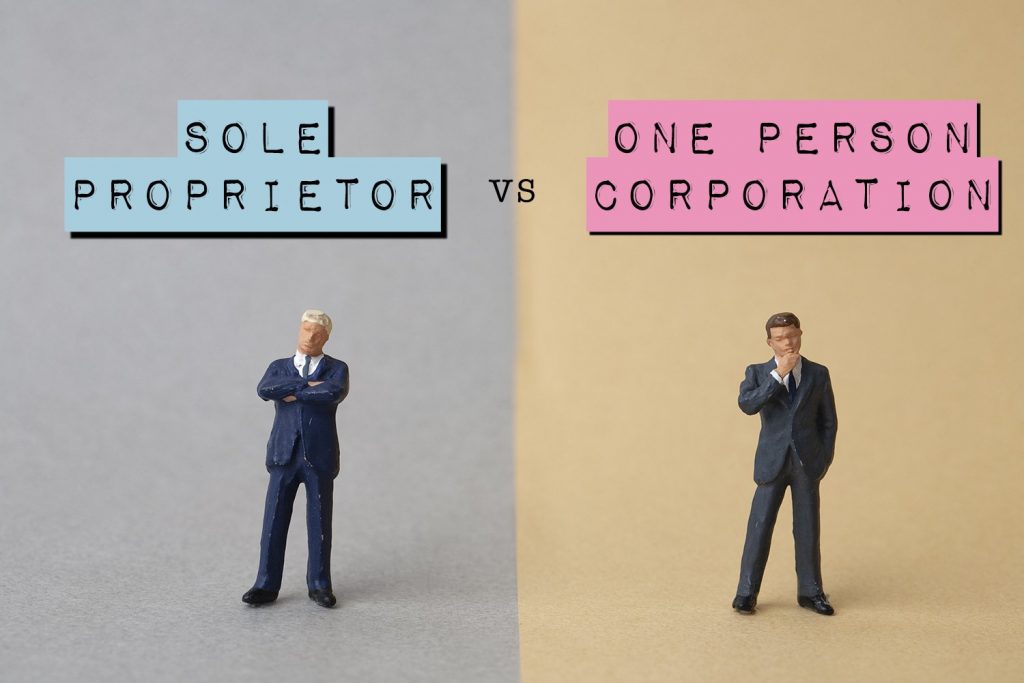A sole proprietorship was the only option for a person who wanted to start a business alone. Now you have an alternative option: a one-person company. The concept of one person company (OPC) allows a single person to run a company limited by shares. A sole proprietorship is an entity run and owned by one individual without distinction between the owner and the business
When it comes to starting a business, entrepreneurs have several options to choose from. Among the various legal structures available, sole proprietorship and one person company (OPC) are two popular choices for individuals looking to establish their own ventures. While both structures cater to single owners, they possess fundamental differences that can significantly impact business operations and legal obligations.

One Person Company
The Companies Act, 2013, introduced the concept of a One Person Company (OPC). An OPC is a hybrid of a sole proprietorship business and a company. An OPC provides a sole proprietor with an opportunity to establish a company. It is considered a private company with limited liability. It has a separate legal entity and must conduct at least one board meeting in each half of the year.
Advantages of OPC
- An OPC has a separate legal entity status from the person establishing it (single member).
- The member’s liability is limited to his/her shares. The member is not personally liable for the company’s loss.
- It is easy to raise capital/funds since OPC is a private company.
- OPC has fewer compliances as compared to private limited companies or LLPs.
- It is easy to incorporate OPC since only one member, and one nominee exists.
- It is easy to manage company affairs since a single person establishes and runs the OPC.
- The OPC has perpetual succession even when only a single member exists.
- Since it is established under the Companies Act, 2013, it has credibility as a business.
Disadvantages of OPC
- It is suitable for only small business structures since the maximum number of members an OPC can have is one.
- The OPC cannot conduct a Non-Banking Financial Investment activity, including the investment in securities of any other company.
- Since the sole member can be the company director, there is no clear distinction between company ownership and management.
Sole Proprietorship
A sole proprietorship business is the simplest business carried on by an individual. A sole proprietor can establish the business under his/her name or a fictitious name. The individual establishing a sole proprietorship business is personally liable for its debts. A sole proprietorship does not have a legal entity like an LLC, OPC or a company. The costs and compliances for starting a sole proprietorship are minimal.
Advantages of Sole Proprietorship
- Minimum compliances to be adhered to start a sole proprietorship.
- It is economical since it is relatively less expensive to start than a company or LLP.
- The sole proprietor will have total control over the business.
- The sole proprietor can take quick decisions without needing approval from anyone.
- The sole proprietor need not conduct board and annual meetings.
- Tax is less since the income tax slab for individuals applies to business profit.
- There is no requirement for mandatory audit for a sole proprietorship when the business type does not require it.
Disadvantages of Sole Proprietorship
- The sole proprietor has unlimited liability, and thus his/her personal assets are liable to pay the business’s debts.
- It has no perpetual succession. Therefore, it comes to an end if the sole proprietor expires.
- It is not easy to raise capital for the business since a single person manages it.
- When the business is at a loss, creditors can file a suit against the sole proprietor.
- Expansion of the business becomes tough since a single person manages it.
Difference between Sole Proprietorship and OPC
| Criteria | Sole Proprietorship | OPC |
| Definition and Legal Framework | A business owned and operated by one person. It is the simplest and most common business structure. | A form of business entity introduced in India in 2016. It is a hybrid between a sole proprietorship and a company, offering limited liability protection to the owner. |
| Ownership and Liability | The owner has unlimited liability for the debts and obligations of the business. | The owner’s liability is limited to the extent of their investment in the OPC. This means that their personal assets are generally protected from creditors of the business. |
| Formation and Compliance | Relatively easy and inexpensive to form. There are few formalities involved. | Requires more formalities than a sole proprietorship, including filing incorporation documents with the Registrar of Companies (ROC). However, it is still simpler and less expensive than forming a company. |
| Continuity and Transferability | The business ceases to exist when the owner dies or becomes incapacitated. | The OPC can continue to exist even if the owner dies or becomes incapacitated. The ownership and management of the OPC can be transferred through a nomination process. |
| Fundraising and Expansion | Limited access to funding as lenders are hesitant to provide loans due to the unlimited liability of the owner. | May have better access to funding compared to a sole proprietorship due to the limited liability protection offered to the owner. However, it may still be challenging to raise large amounts of capital. |
FAQs
Can a sole proprietorship be converted to OPC?
Yes, a sole proprietorship can be converted to an OPC by registering the OPC and transferring the assets and liabilities of the sole proprietorship to the OPC.
How does OPC differ from a single proprietorship?
OPC is a separate legal entity distinct from its owner, providing limited liability to the owner, while a sole proprietorship does not have a separate legal existence, and the owner has unlimited liability. OPC is governed by the Companies Act, 2013, while a sole proprietorship is not.